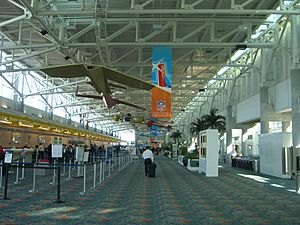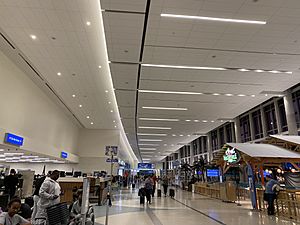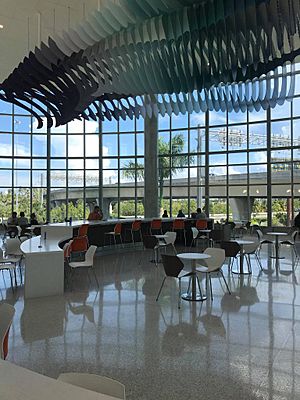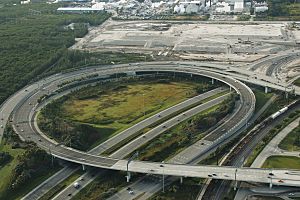Fort Lauderdale–Hollywood International Airport facts for kids
Quick facts for kids
Fort Lauderdale–Hollywood International Airport
|
|||||||||||||||
|---|---|---|---|---|---|---|---|---|---|---|---|---|---|---|---|
 |
|||||||||||||||
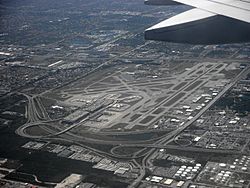 |
|||||||||||||||
| Summary | |||||||||||||||
| Airport type | Public | ||||||||||||||
| Owner/Operator | Broward County Aviation Department | ||||||||||||||
| Serves | Miami metropolitan area | ||||||||||||||
| Location | Unincorporated Broward County, Florida, United States | ||||||||||||||
| Opened | 1929 | ||||||||||||||
| Hub for |
|
||||||||||||||
| Focus city for | JetBlue | ||||||||||||||
| Elevation AMSL | 65 ft / 20 m | ||||||||||||||
| Coordinates | 26°04′21″N 080°09′10″W / 26.07250°N 80.15278°W | ||||||||||||||
| Map | |||||||||||||||
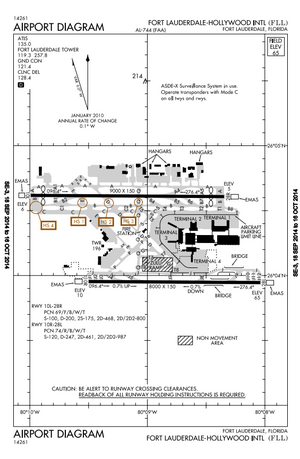 FAA diagram |
|||||||||||||||
| Runway | |||||||||||||||
|
|||||||||||||||
| Statistics (2022) | |||||||||||||||
|
|||||||||||||||
|
Source: Federal Aviation Administration
|
|||||||||||||||
The Fort Lauderdale–Hollywood International Airport (FLL) is a very important airport in Broward County, Florida, United States. It's one of three main airports serving the busy Miami metropolitan area. You can find it near major roads like Interstate 95 and U.S. Route 1. The airport is located close to the cities of Fort Lauderdale, Hollywood, and Dania Beach. It's about 3 miles (5 km) southwest of downtown Fort Lauderdale.
FLL is a busy place with over 700 flights every day. These flights go to 135 different places, both in the U.S. and around the world. Since the late 1990s, it has become a major airport for international travel. FLL is the main airport for areas like Fort Lauderdale, Pompano Beach, and Boca Raton. It also helps serve parts of Miami. Many airlines use FLL as a key airport. These include Allegiant Air, JetBlue, and Spirit Airlines. Spirit Airlines even has its main office nearby! The U.S. Federal Aviation Administration calls FLL a "major hub" for air travel.
Contents
A Look at the Airport's History
Early Days: 1926–1959
The airport's story began in 1928. A pilot from World War I, Merle Fogg, bought an old golf course. It had been damaged by a big hurricane in 1926. On May 1, 1929, the airport officially opened. It was called Merle Fogg Field and had two dirt runways.
When World War II started, the United States Navy took over the airport. They renamed it Naval Air Station Fort Lauderdale. The runways were paved, and a control tower was built. At first, the base helped prepare civilian planes for military use. These planes were then flown across the Atlantic Ocean. Later, it became a training base for Navy and Marine pilots. They learned to fly planes like the Grumman TBF and TBM Avenger.
Naval Air Station Fort Lauderdale was also the home base for Flight 19. This was a group of five Avenger planes that disappeared in December 1945. This event is part of the mystery of the Bermuda Triangle.
The Navy base closed on October 1, 1946. The county then took control, and it became Broward County International Airport.
Commercial flights to Nassau started in 1953. Domestic flights within the U.S. began in 1958–1959. Airlines like Northeast Airlines and National Airlines flew to New York and Washington. In 1959, the airport opened its first permanent terminal building. It also got its current name: Fort Lauderdale–Hollywood International Airport.
Growing Bigger: 1960–1999
The airport grew a lot in the 1960s and 70s. In 1966, there were about 48 airline flights each day. By 1972, this number jumped to 173 flights daily!
More and more cities got direct flights from FLL. By 1971, you could fly nonstop to major cities like Atlanta, Boston, Chicago, and Detroit.
By 1974, many big airlines served FLL. These included Braniff International Airways, Delta Air Lines, and United Airlines. Delta and Eastern Air Lines were the busiest. In the 1990s, low-cost airlines became popular. Southwest Airlines started its base here in 1996. Spirit Airlines followed in 1999, and JetBlue in 2000. Spirit Airlines made FLL a main hub in 2002. JetBlue also made FLL a "focus city" in 2003. This growth meant that some older, bigger airlines reduced their flights from FLL.
Recent Times: 2000–Present
In 2000, South African Airways started flights from Cape Town to Atlanta with a stop in Fort Lauderdale. However, new security rules after the September 11 attacks meant this stop had to be removed.
FLL was affected by hurricanes in 2005. Hurricane Katrina caused minor damage and closed the airport for about two days. Hurricane Wilma caused more serious damage, like broken windows and damaged jetways. The airport had to close for five days.
In 2016, Emirates announced daily flights from Dubai to Fort Lauderdale. They chose FLL because of a partnership with JetBlue. This service ended in 2020 due to the COVID-19 pandemic.
On January 6, 2017, a serious incident happened inside Terminal 2. A person started shooting, and five people died. Police quickly arrested the shooter within 85 seconds. The airport was closed for a time as authorities worked to secure the area and help those affected.
Since 2018, the airport has been undergoing a huge renovation and expansion. This project is worth about $3 billion! It's adding more gates, new parking, and more stores and shops. The plan also includes a new transportation center and a hotel. The goal is to increase the number of gates from 62 to 95.
In 2023, El Al announced direct flights from Tel Aviv, Israel, to FLL. This was the first direct flight to Israel from the airport.
In April 2023, the area experienced historic flooding. This caused major problems at the airport. Rainwater flooded parts of the runways and airport property, leading to a complete closure.
Airport Facilities
Fort Lauderdale–Hollywood International Airport is a large airport. It covers about 1,380 acres (558 hectares). It has two main runways for planes to take off and land:
- 10L/28R: 9,000 feet long (2,743 meters) with an asphalt surface.
- 10R/28L: 8,000 feet long (2,438 meters) with a concrete surface. This runway was made bigger in 2014.
As of December 2021, 111 aircraft were based at FLL. These included single-engine planes, multi-engine planes, jets, and helicopters.
Silver Airways has its main office in a building at the airport.
Terminals: Where You Catch Your Flight
Fort Lauderdale–Hollywood International Airport has four terminals with a total of 66 gates.
- Terminal 1, also called the Yellow Terminal, has Concourses A, B, and C with 23 gates. Concourse A is mainly for international flights. Southwest Airlines uses Concourse B a lot.
- Terminal 2, the Red Terminal, has Concourse D and 9 gates. Air Canada and Delta Air Lines use this terminal. Delta has a Sky Club lounge here. This terminal is being updated with new check-in areas, security, and shops.
- Terminal 3, known as the Purple Terminal, has Concourses E and F with 20 gates. This is the main base for JetBlue. It has a food court with popular restaurants. You can walk from Terminal 3 to Terminal 4 using a new walkway.
- Terminal 4, the Green Terminal, has Concourse G with 14 gates. This is the main base for Spirit Airlines. Concourse G is a new, three-story building with modern gates and an expanded area for U.S. Customs and Border Protection.
Getting Around: Ground Transportation
The airport is close to the Fort Lauderdale/Hollywood International Airport at Dania Beach train station. This station serves Amtrak trains and Tri-Rail commuter trains. Tri-Rail offers a free shuttle bus service from the station to three spots at the airport.
You can also reach the terminals by car using U.S. Route 1 and other major roads like Interstate 95. There's even an underpass on U.S. Route 1 that goes under one of the runways!
Ride-sharing services like Uber and Lyft can pick you up and drop you off at special areas. The airport also has parking lots and a place to rent cars. You can walk to the rental car facility from Terminal 1, or take a free shuttle bus from other terminals.
Local buses from Broward County Transit also serve FLL. Route 1 connects the airport to downtown Fort Lauderdale and Aventura Mall.
Art at the Airport
There's a cool art piece at the airport called Vendor with Walkman. It was created by the famous artist Duane Hanson. It's a sculpture of a middle-aged man sitting down, wearing a red T-shirt and listening to a walkman. The sculpture includes details like a toy airplane and signs, telling a story about the vendor. It used to be in Terminal 3 but is now in Terminal 1.
Airlines and Where They Fly
Passenger Flights
| Airlines | Destinations | Refs |
|---|---|---|
| Air Canada | Montréal–Trudeau, Toronto–Pearson | |
| Air Canada Rouge | Montréal–Trudeau, Toronto–Pearson Seasonal: Ottawa, Québec City |
|
| Air Transat | Montréal–Trudeau, Québec City, Toronto–Pearson Seasonal: Halifax |
|
| Alaska Airlines | Seattle/Tacoma Seasonal: Los Angeles, Portland (OR), San Diego, San Francisco |
|
| Allegiant Air | Akron/Canton, Allentown, Appleton, Asheville, Belleville/St. Louis, Charlotte/Concord, Cincinnati, Columbus–Rickenbacker, Fayetteville/Bentonville, Greenville/Spartanburg, Harrisburg, Indianapolis, Knoxville, Lexington, Louisville, Memphis, Norfolk, Peoria, Plattsburgh (NY), Sioux Falls, Syracuse Seasonal: Bangor, Cedar Rapids/Iowa City (begins November 17, 2023), Des Moines, Flint, Grand Rapids, Nashville (begins November 16, 2023) |
|
| American Airlines | Charlotte, Chicago–O'Hare, Dallas/Fort Worth, Los Angeles, Philadelphia, Washington–National (resumes November 5, 2023) | |
| Avelo Airlines | New Haven (CT), Raleigh/Durham, Wilmington (DE), Wilmington (NC) | |
| Avianca | Bogotá | |
| Azul Brazilian Airlines | Belém, Belo Horizonte–Confins, Campinas, Manaus, Recife | |
| Bahamasair | Freeport, Nassau | |
| Canada Jetlines | Toronto–Pearson (begins September 3, 2023) | |
| Caribbean Airlines | Kingston, Port of Spain Seasonal: Montego Bay |
|
| Copa Airlines | Panama City–Tocumen | |
| Delta Air Lines | Atlanta, Boston, Cincinnati, Detroit, Los Angeles, Minneapolis/St. Paul, New York–JFK, New York–LaGuardia, Raleigh/Durham, Salt Lake City, Seattle/Tacoma | |
| El Al | Tel Aviv (begins September 13, 2023) | |
| Flair Airlines | Toronto–Pearson Seasonal: Kitchener/Waterloo, Montréal–Trudeau (begins October 29, 2023) |
|
| Frontier Airlines | Atlanta, Buffalo, Chicago–Midway, Cleveland, Long Island/Islip, Philadelphia, Phoenix–Sky Harbor, Trenton | |
| JetBlue | Albany, Atlanta, Austin, Bogotá, Boston, Buffalo, Cancún, Charleston (SC), Guayaquil, Hartford, Havana, Jacksonville (FL), Kingston–Norman Manley, Las Vegas, Lima, Los Angeles, Medellín–JMC, Montego Bay, Nashville, Nassau, Newark, New Orleans, New York–JFK, New York–LaGuardia, Port-au-Prince, Providence, Punta Cana, Quito, Raleigh/Durham, Richmond, Salt Lake City, San Diego, San Francisco, San José de Costa Rica–Juan Santamaría, San Juan, Santo Domingo–Las Americas, Tallahassee (begins January 4, 2024), Washington–National, White Plains, Worcester Seasonal: Aguadilla, Hayden/Steamboat Springs |
|
| Norse Atlantic Airways | London–Gatwick (ends September 17, 2023), Oslo (ends September 15, 2023) | |
| Silver Airways | Charleston (SC), Freeport, Gainesville (begins August 21, 2023), George Town, Governor's Harbour, Jacksonville (FL), Key West, Marsh Harbour, North Eleuthera, Orlando, Savannah, South Bimini, Tallahassee, Tampa | |
| Southwest Airlines | Atlanta, Austin, Baltimore, Cancún, Chicago–Midway, Chicago–O'Hare, Columbus–Glenn, Dallas–Love, Denver, Grand Cayman, Havana, Houston–Hobby, Indianapolis, Kansas City, Milwaukee, Montego Bay, Nashville, Nassau, New Orleans, Orlando, Pittsburgh, Providenciales, Punta Cana, Raleigh/Durham, San Juan, St. Louis, Tampa, Washington–National Seasonal: Albany, Buffalo, Hartford, Las Vegas, Louisville, Manchester (NH), Minneapolis/St. Paul, Omaha (begins January 13, 2024), Philadelphia, Phoenix–Sky Harbor, Providence, Rochester (NY), San Antonio |
|
| Spirit Airlines | Aguadilla, Armenia (Colombia), Aruba, Atlanta, Atlantic City, Austin, Baltimore, Barranquilla, Bogotá, Boston, Bucaramanga, Cali, Cancún, Cap-Haïtien, Cartagena, Charleston (SC), Charlotte, Chicago–O'Hare, Cleveland, Columbus–Glenn, Dallas/Fort Worth, Denver, Detroit, Guatemala City, Guayaquil, Houston–Intercontinental, Indianapolis, Kingston–Norman Manley, Las Vegas, Lima (ends September 4, 2023), Los Angeles, Louisville, Managua, Manchester (NH), Medellín–JMC, Milwaukee, Montego Bay, Myrtle Beach, Nashville, Newark, New Orleans, New York–LaGuardia, Norfolk, Orlando, Pensacola, Philadelphia, Phoenix–Sky Harbor, Pittsburgh, Port-au-Prince, Punta Cana, Raleigh/Durham, Richmond, San Antonio, San José de Costa Rica–Juan Santamaría, San Juan, San Pedro Sula, San Salvador, Santiago de los Caballeros, Santo Domingo–Las Américas, St. Croix, St. Louis, St. Maarten, St. Thomas, Tampa, Tegucigalpa/Comayagua Seasonal: Kansas City, Minneapolis/St. Paul, Oakland |
|
| Sun Country Airlines | Seasonal: Minneapolis/St. Paul | |
| United Airlines | Chicago–O'Hare, Cleveland, Denver, Houston–Intercontinental, Newark, San Francisco, Washington–Dulles | |
| Western Air | Nassau | |
| WestJet | Toronto–Pearson Seasonal: Calgary |
Cargo Flights
| Airlines | Destinations |
|---|---|
| FedEx Express | Atlanta, Dallas/Fort Worth, Fort Worth/Alliance, Greensboro, Indianapolis, Jacksonville, Lubbock, Memphis, Nashville, Newark, New Orleans, Orlando, Tampa |
| FedEx Feeder | Key West, Marathon, Tallahassee |
| IBC Airways | Miami |
| UPS Airlines | Fort Myers, Louisville, Miami, Orlando |
Airport Statistics
Most Popular Destinations
| Rank | City | Passengers | Airlines |
|---|---|---|---|
| 1 | Atlanta, Georgia | 1,225,000 | Delta, JetBlue, Southwest, Spirit |
| 2 | Newark, New Jersey | 821,000 | JetBlue, Spirit, United |
| 3 | New York–LaGuardia, New York | 721,000 | Delta, JetBlue, Spirit |
| 4 | New York–JFK, New York | 649,000 | American, Delta, JetBlue |
| 5 | Baltimore, Maryland | 494,000 | Southwest, Spirit |
| 6 | Charlotte, North Carolina | 435,000 | American, Spirit |
| 7 | Boston, Massachusetts | 430,000 | Delta, JetBlue, Southwest, Spirit, United |
| 8 | Dallas/Fort Worth, Texas | 411,000 | American, Spirit |
| 9 | Chicago-O'Hare, Illinois | 394,000 | American, JetBlue, Spirit, United |
| 10 | Philadelphia, Pennsylvania | 388,000 | American, Frontier, Southwest, Spirit |
| Rank | City | Passengers | Airlines |
|---|---|---|---|
| 1 | 444,458 | JetBlue, Southwest, Spirit | |
| 2 | 415,443 | Air Canada, Air Canada Rouge, Air Transat, Flair, WestJet | |
| 3 | 377,843 | Air Canada, Air Canada Rouge, Air Transat, Flair | |
| 4 | 300,294 | JetBlue, Southwest, Spirit | |
| 5 | 271,752 | JetBlue, Southwest, Spirit | |
| 6 | 262,545 | JetBlue, Spirit | |
| 7 | 249,192 | Caribbean, JetBlue, Spirit | |
| 8 | 240,670 | Avianca, JetBlue, Spirit | |
| 9 | 235,345 | JetBlue, Spirit | |
| 10 | 225,652 | Bahamasair, JetBlue, Silver, Southwest, Western Air |
How Many Passengers Use FLL Each Year?
| Year | Passengers | Year | Passengers | Year | Passengers |
|---|---|---|---|---|---|
| 1997 | 12,277,411 | 2007 | 22,681,903 | 2017 | 32,511,053 |
| 1998 | 12,453,874 | 2008 | 22,621,698 | 2018 | 35,963,370 |
| 1999 | 13,990,692 | 2009 | 21,061,131 | 2019 | 36,747,622 |
| 2000 | 15,860,004 | 2010 | 22,412,627 | 2020 | 16,484,132 |
| 2001 | 16,407,927 | 2011 | 23,349,835 | 2021 | 28,076,808 |
| 2002 | 17,037,261 | 2012 | 23,569,103 | 2022 | 31,686,404 |
| 2003 | 17,938,046 | 2013 | 23,559,779 | ||
| 2004 | 20,819,292 | 2014 | 24,648,306 | ||
| 2005 | 22,390,285 | 2015 | 26,941,511 | ||
| 2006 | 21,369,787 | 2016 | 29,205,002 |
Images for kids
See also
 In Spanish: Aeropuerto Internacional de Fort Lauderdale-Hollywood para niños
In Spanish: Aeropuerto Internacional de Fort Lauderdale-Hollywood para niños
 | Chris Smalls |
 | Fred Hampton |
 | Ralph Abernathy |


